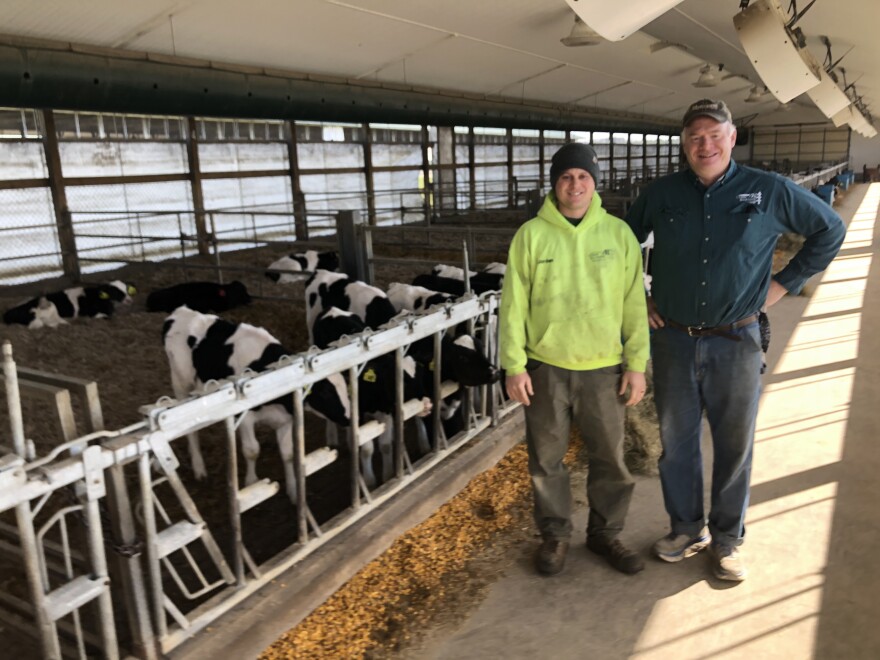Updated 12:37 p.m. CDT
The image of fields of waving corn and grazing cattle personifies Wisconsin, as does its abundant lakes and streams. But balancing the health of both has become increasingly complex.
Recently, a collection of environmental and agricultural groups set out to propose policies focused on long-term solutions for keeping farms and water sources clean. In some areas of the state, farmers are already banding together to improve the watersheds they share.
As our Earth Week series continues, environmental reporter Susan Bence takes us to Waterloo, Wisconsin — about 20 miles northeast of Madison.
Tom Crave and his brothers were raised on a 40-cow dairy farm an hour’s drive south of the family’s now 3,000-acre farming operation.
The Craves now milk 1,900 cows.

Jordan Crave, Tom’s nephew, manages the crop side of the operation, planning their rotation five years in advance.
“We have the livestock, which produce manure, which is a great nutrient resource for the soil and for our plants and we can return the manure to the land, use that to grow more feed that we harvest and feed to the livestock so it’s a very sustainable practice,” he says.
Because of the size of their herd, state law requires the Craves to come up with and adhere to a plan to reduce runoff from fields that can pollute rivers, streams and percolate into groundwater.
Tom Crave says that practice just makes good sense for any size farm.
“Right now, 38% of the land falls under a nutrient management plan, the rest does not have one. So this is my opinion, if everybody would implement a nutrient plan, whether you have livestock or you’re a cash cropper, you would improve the environment, and it’s relatively simple,” he says.

He says it’s one of the strategies discussed when environmental groups, including Clean Wisconsin, Wisconsin Land and Water Conservation Association and The Nature Conservancy, sat down with the Dairy Business Association. Crave was the association’s president at the time and the groups begin brainstorming policies to support clean water and farming.
“Our goal is to try to improve the environment and sustain the dairy industry, and everybody has agreed that both can co-exist, and we can accomplish a lot as a united group,” he says.
The group came up with a blueprint, Clean Drinking Water and Resilient Farms by 2030, released earlier this month. It proposes funding to address contaminated private wells and creating financial incentives for farmers who plant cover crops, or crops grown to protect and enrich the soil.
Margaret Krome’s is the policy director for the Michael Fields Agricultural Institute and she says she loves the plan.
“I think it’s a statement that the farming groups recognize that we do have some problems and we trust these partners to work with us in solving them. That’s the attitude that brings us the kinds of solutions that help people at all levels,” she says.
Krome points to an initiative included in the proposed blueprint that gives money to farmer-led watershed conservation groups, something she thinks can be a win for both farmers and the environment.
She knows because she has already helped start one of these groups. In 2016, Margaret Krome planted the seed among a small cluster of farmers in Iowa County in the southwest corner of the state.
Michael Dolan, a seventh-generation farmer, was first to say yes. “Soil conversation, water quality, I mean all of it, I really want this this area to be clean and to reduce our runoff as well as downstream — we started working with fishermen,” he says.
Their small watersheds flow into the Wisconsin River, but Dolan doesn’t mean those who fish there. The Iowa county farmers learned their runoff eventually makes its way down the Mississippi River to the Gulf of Mexico, where fishermen are increasingly challenged by pollutants that make the water unfit for shrimp and other life.
Dolan and a group of Iowa county farmers visited and saw for themselves. “They showed us what life is like down there and the challenges they’re dealing with. It’s pretty eye opening. … They have to keep going further and further out to go shrimping because nothing is living in those areas,” he says.
Paul Bickford has been farming in Iowa County for 40 years and was also a part of the group’s trip down south.

“You forget about what’s downstream from us. The work they have to do down there to make a living down there is parallel or even harder than a dairy farmer here in the Midwest. It’s a compilation of a lot poor choices here in the Midwest that causes a lot of problems down there,” he says.
What may seem like a far-away connection has strengthened these farmers’ resolve to do their part to reduce polluting runoff. Because they also echoed the fact that they can’t imagine their life without their farm.
“If someone would have told me how many hours I would work,” says Dolan. “Still, it’s tremendously rewarding, enjoying the fruits of our labor, working with your family, it’s pretty awesome."
Have an environmental question you'd like WUWM's Susan Bence to investigate? Submit below.
_







